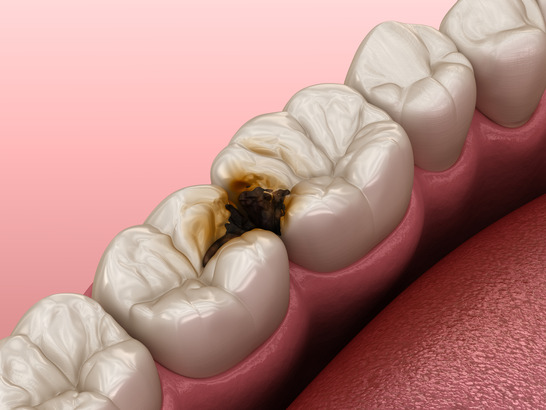Cavities are a common dental issue that, when left untreated, can lead to serious oral health complications. While it may seem harmless initially, untreated cavities can progress from minor tooth decay to severe damage, requiring extensive treatment. In this article, we will explore what happens if you don’t fix a cavity, how long you can leave it untreated, and the potential health risks involved.
What is a Cavity?
A cavity is a hole that forms in your tooth as a result of decay, caused by a buildup of bacteria and plaque on your teeth. Plaque produces acids that gradually erode the enamel, the hard outer layer of your tooth. Once the enamel is compromised, the decay continues to progress, eating away at deeper layers of the tooth. If left untreated, this process can result in serious dental issues and potentially lead to the loss of the tooth.
What the Research Says
According to research, cavities are a widespread issue, with 92% of adults experiencing them at some point. Approximately 26% of those cavities are left untreated, often due to a lack of awareness of the severity of the problem or avoidance of dental care. Factors that increase the likelihood of cavities include poor oral hygiene, a high-sugar diet, dry mouth, and insufficient fluoride exposure. The longer a cavity is left untreated, the more damage it causes, which increases the complexity and cost of treatment.
Common Symptoms of a Cavity
Cavities can sometimes develop without noticeable symptoms in their early stages. However, as they progress, common signs of a cavity include:
Gum inflammation: In some cases, the area around the tooth may become swollen or red.
Tooth pain: Ranging from mild discomfort to severe throbbing.
Sensitivity: Particularly when eating or drinking hot, cold, or sugary substances.
Visible holes or pits: Cavities can create visible damage to the tooth’s surface.
Discoloration: White, brown, or black spots may appear on the tooth.
Bad breath: Due to bacterial buildup and decay.

What Happens If You Don’t Treat a Cavity?
1. Early Stage: Enamel Damage
In the beginning, the cavity primarily affects the enamel. At this point, the tooth may still be repairable with fluoride treatments or fillings if caught early. However, if ignored, the cavity will progress deeper into the tooth. You may not feel any pain or discomfort in this stage, making regular dental checkups vital for detecting early cavities before they worsen.
2. Dentin Decay
Once the cavity reaches the dentin, the layer beneath the enamel, you’ll likely experience increased sensitivity to temperature and pressure. The softer dentin decays faster than the enamel, and the cavity grows at an accelerated rate. Without intervention, the decay can cause significant structural damage to the tooth.
3. Infection of the Pulp
As the cavity progresses deeper, it reaches the pulp, the innermost part of the tooth that contains nerves and blood vessels. At this point, severe pain is common, and the tooth becomes highly sensitive. The pulp can become infected, leading to an abscess, a painful pocket of pus at the root of the tooth. This infection can cause swelling, fever, and discomfort.
4. Tooth Loss and Spread of Infection
If a cavity continues to go untreated, the infection can spread beyond the tooth to the surrounding gums, bone, and other areas of the body. In rare cases, untreated infections from dental cavities can spread to vital organs, potentially causing life-threatening complications such as sepsis. Additionally, the tooth may become so damaged that it requires extraction, leading to further oral health issues like bone loss and shifting of the remaining teeth.
How Long Can You Leave a Cavity Untreated?
The length of time you can leave a cavity untreated depends on factors like its size, location, and your overall oral hygiene. According to dental experts, small cavities can take months or even years to become problematic, but the decay process is continuous. A cavity that has reached the dentin may start causing pain and further damage within months. Once it reaches the pulp, the infection can spread quickly, resulting in the need for more complex procedures like root canals or tooth extractions.
Waiting too long to address a cavity increases the likelihood of complications and more invasive treatments. It’s crucial to fill cavities as soon as they are discovered to prevent further decay and the need for extensive dental work.
How to Treat a Cavity
The treatment for a cavity varies depending on its stage of development:
- Fluoride Treatment: In the earliest stages of tooth decay, a fluoride treatment can help remineralize the tooth and reverse the cavity.
- Dental Fillings: Once a cavity has formed, your dentist will remove the decayed material and fill the tooth with a composite or amalgam filling to restore its structure. Learn more about dental filling options.
- Crowns: If the decay has severely damaged the tooth, a crown may be needed to cover and protect the remaining tooth structure. Discover more about dental crown.
- Root Canal: When the infection reaches the pulp, a root canal is required to remove the infected tissue, clean the tooth, and seal it to prevent further infection.
- Tooth Extraction: In extreme cases where the tooth is beyond repair, it may need to be extracted, and options such as a dental implant, denture or bridge can be considered to replace the missing tooth.
Preventing Cavities
Preventive care is the most effective way to avoid cavities. Here are some tips to keep your teeth cavity-free:
- Brush Twice Daily: Use fluoride toothpaste to help strengthen enamel and prevent decay.
- Floss Daily: Cleaning between your teeth prevents plaque buildup and reduces the risk of cavities.
- Limit Sugary and Acidic Foods: Reducing sugar and acidic foods in your diet minimizes the formation of harmful bacteria that cause cavities.
- Use Fluoride Mouthwash: Fluoride mouthwash helps remineralize enamel and protects against decay.
- Regular Dental Checkups: Visit your dentist every six months for professional cleanings and to catch cavities early.
Conclusion
Ignoring a cavity can have serious consequences for your oral and overall health. While small cavities may not cause immediate discomfort, they will continue to grow and can lead to pain, infection, and tooth loss if left untreated. Regular dental visits, proper oral hygiene, and early treatment can prevent complications and help maintain your oral health. Don’t wait—address cavities early to avoid more invasive and costly procedures.
Call to Action
If you suspect you have a cavity or it’s time for a dental checkup in Etobicoke, schedule an appointment with Thorncrest Dental today. Early treatment is the key to preventing further decay and ensuring a healthy smile.and get the professional care you need to prevent further complications.




